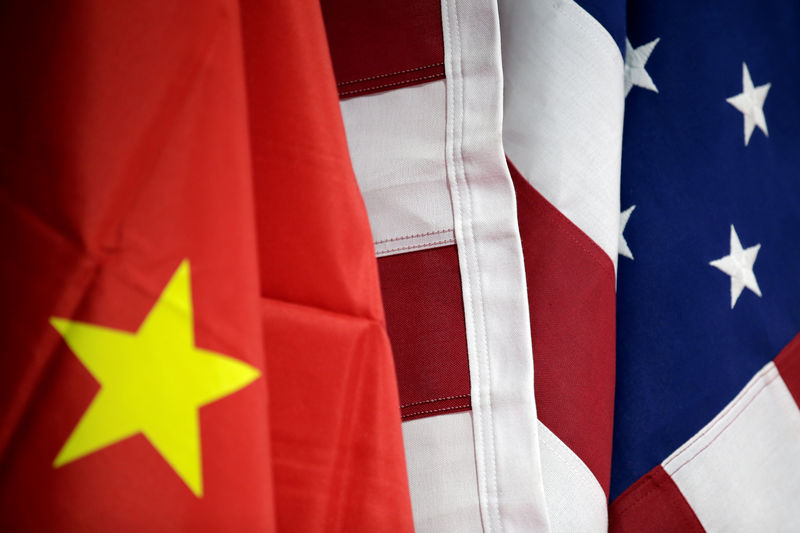By Jing Xu and Echo Wang
BEIJING/WASHINGTON (Reuters) - Surprised and upset by the U.S. blacklisting of Chinese companies, China has lowered expectations for significant progress from this week's trade talks with the United States, Chinese government officials told Reuters, even as President Donald Trump on Wednesday expressed fresh optimism.
While Beijing theoretically wants to end the trade war, Chinese Communist Party officials are not optimistic about the size or scope of any agreement with Washington in the short-term, the Chinese officials said.
Top U.S. and Chinese trade and economic officials will meet in Washington on Thursday and Friday to try to end a 15-month-old trade war that is slowing the global economy and threatens to upend decades-old trade systems. Chinese Vice Premier Liu He, U.S. Trade Representative Robert Lighthizer and Treasury Secretary Steven Mnuchin are due to take part.
Without significant progress, Trump is set to hike the tariff rate on $250 billion worth of Chinese goods to 30% from 25% next Tuesday.
Speaking to reporters in Washington, Trump said: "If we can make a deal, we're going to make a deal, there's a really good chance."
"In my opinion China wants to make a deal more than I do," Trump added.
Based on the current situation, there is a possibility that this week's talks between the world's two largest economies could end in a deadlock, according to a Chinese official briefed on preparations for the talks who spoke on condition of anonymity. Asked about the probability of reaching an agreement, the official said, "This is not an easy task. It requires a lot of preparation work and consensus on both sides."
For trade relations or overall ties between the two countries to improve, more time is needed, Chinese officials said.
While previous lower-level talks between U.S. and Chinese officials aimed to create a good atmosphere for the upcoming meeting, the U.S. blacklisting of 28 Chinese companies has generated a negative atmosphere instead, Chinese officials said.
The U.S. Department of Commerce on Monday blacklisted video surveillance firm Hikvision and 27 others, days ahead of the talks. The Commerce Department barred the technology and artificial intelligence companies from doing business with U.S. firms, citing human rights violations of Muslim minority groups in Xinjiang. Chinese officials said the action interfered with China's sovereignty.
Both sides should not escalate disputes or they will drift apart, said a second Beijing-based Chinese official briefed on the talks this week.
The trade talks come in the wake of tit-for-tat bans on certain visas for each other's officials and a controversy sparked by a Twitter post by an executive with the National Basketball Association's Houston Rockets supporting anti-government protests in Hong Kong.
"We can add the Diplomatic war to the Financial war, Currency war and Technology war, that we already have," John Browning, managing director at brokerage BANDS Financial in Shanghai, said in a note to investors.
While there is a huge contingent of high-level Chinese officials traveling to Washington, "to my jaded perception it looks less than a delegation rather a funeral cortege," Browning wrote.
The U.S. demand that the Chinese Communist Party fundamentally change how it directs China's massive economy to shift to a more Western model of free-market capitalism is irrational and misguided, a Chinese diplomat in the United States said.
"What we achieved during the past few decades shows that our system is good for development in China," the official said, speaking on condition of anonymity.
China would not ask the United States to shift to an economy that relies heavily on state-owned enterprises, or ask it to start fully funding education, as China's does, he said, so why should Washington expect the same from Beijing?
"We hope to strike an agreement but also accept the differences," the diplomat added.
Western governments' treatment of China in the past, including welcoming the country into multilateral organizations such as the World Trade Organization, has been predicated on the assumption that this ultimately would lead to Beijing's liberalization and gradual embrace of democratic norms.
Washington is expected to press new demands for Beijing to protect U.S. intellectual property this week, but both sides have very different views of that topic as well.
Chinese officials contend that China did not steal intellectual property in the past, saying Western companies gave it up willingly and reaped the benefits.
"Many decisions were made based on entrepreneurial partnerships," the U.S.-based Chinese official said, adding that they have mostly benefited Western companies.

For example, for every $1,000 iPhone, China's share of production is just $70, the official said.